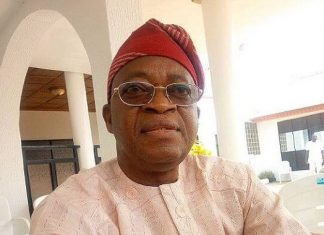Customarily, men have always been morticians (or undertakers) but not anymore as women have been making inroads over the years. Assistant Life Editor, TERH AGBEDEH, meets some of these women.
Okusanya-Feyita (middle) directing her father’s funeral
The mention of death plays up as much mystery as when morticians are referred to. It would appear that the mystery is even more profound when a woman is a mortuary scientist or funeral director. Traditionally, the profession is run by men, who serve as pall-bearers, band men, and women have often played the role of flower girls, dancers or decorators.
The death of MIC Funeral boss, Tunji Okusanya, in a plane crash that also claimed his son and four of the company’s staff last October put his daughter, Bolanle Okusanya-Feyita, in charge as acting director of the company that has been in business since 1946. In fact, she was the one who served as director at the burial of her father.
But before she came over from the United Kingdom for the seat she is currently occupying, there had been other women undertakers in the country. Prominent among them is the award-winning Mrs. Taiwo Ogunsola of the Lagos-based TOS Funerals, who studied mortuary science in the UK and is licensed to practise there as well as in the United States of America. There was also Mrs. Kafilat Sanni of Kafsan Funerals and the up-and-coming Funmi Clement, who is currently studying embalming in the UK but works at the Lagos University Teaching Hospital (LUTH) mortuary.
Of the four women, TheNiche was able to speak with two – Ogunsola and Clement – on the challenges women face and the mystery of the mortuary business. Okusanya-Feyita, who is well known as a make-up artist and the fashion editor for OK Nigeria magazine, declined comment, and Sanni could not be reached as at press time.
About challenges, Ogunsola said there is really no difference whether you are a man or woman in the mortuary business.
“It is like a daily occurrence in the mortuary; people are waiting for you, shouting at you, everybody wants to take their corpse at the same time,” she said.
She totally disagrees that the mortuary business is for men.
“I trained in England and we have more ladies embalming than men. They are funeral directors who go on funerals; they are pall-bearers so to say. But when I got to Nigeria in the late 1990s, I realised that I was the only one on the ground, and that took me by surprise; that we don’t have enough women doing this thing.”
She would like to have more ladies come onboard.
“As we speak, I will just say that we are just one and half. I am the one that is fully licensed and there is one student. I don’t think it is right; we should encourage more ladies to come onboard,” she stated.
She undid the mystery generally weaved around morticians, particularly the belief that they seek special powers to function efficiently, describing it as a big lie.
“There is no such power. I am a prophetess and I belong to the Cherubim and Seraphim (C&S) Church |Movement. It is like me asking you what powers you have to be doing journalism. So it is the same thing with me. I don’t have any powers than God. I have never been to any occult movement in my life. I don’t even know what they do there. To be honest with you, there is nothing strange about this job, to me. Somebody must do the job and do it well, too. Once you are trained, you should be able to do this job. There is nothing special about it. It is nothing special; it is like any other job,” she said.
Clement, who said she became a mortician because she was in dire need of a job after she completed her master’s degree in 2006, is on the same page with Ogunsola about training.
“They must be qualified. If the country can get five to six people that have been in this business for a while, then they can train new experts,” she said.
But it has not been a walk in the park for her, particularly at the beginning of her foray into the business. “It wasn’t fun initially, but I learnt my environment, I asked questions, I went online, searched, asked the people around me, so I got along early and well.”
But what does it involve really?
“I am being trained as an embalmer. Where I work, we only deal with preserving bodies till the relatives are ready to take them away for burial,” she explained.
Clement said that at the point she joined the mortuary, not many graduates were interested in working in the mortuary, but all of that has since changed.
“Most of the people working in mortuaries these days are graduates,” she disclosed.
There is no doubt that the business of taking care of the dead and preparing them for interment is a very important one, since death is a necessary end for all humans.
Like Ogunsola said, someone has to do the job, and from the look of things, the funeral business is indeed lucrative. Three hours each spent at the MIC and TOS receptions saw a sizeable number of bereaved relatives inquiring after the services from both homes. The spin-off is that many jobs are being created directly or indirectly from the business. Carpenters, pall-bearers, musicians, decorators are an integral part of the entire business.













